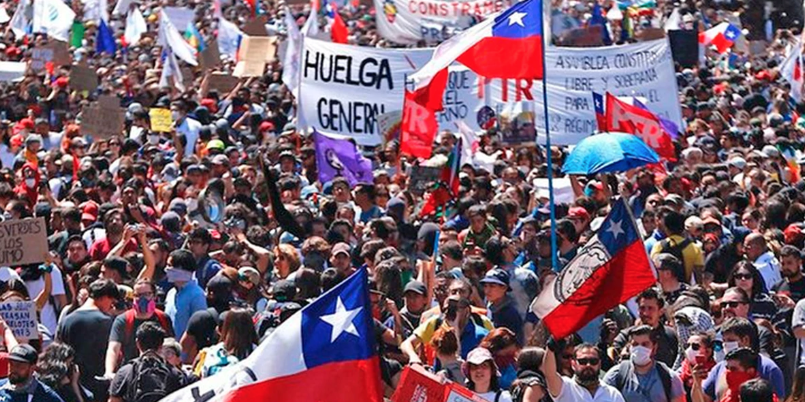Share This:
February 19, 2020 | Theatre,
The Fire This Time
In his poem “Harlem,” Langston Hughes posed the famous question “What happens to a dream deferred? Does it dry up, like a raisin in the sun?… Or does it explode?
On October 18, 2019, Chile exploded into an intergenerational conflict that brought several million people into the streets all over the country for weeks on end. It was touched off by the government’s announcement that they would be raising the subway fares and the spontaneous response of students who, with no hope of paying for the rising cost of living, began jumping turnstiles and trashing subway stations. Police responded with tear gas, water cannons, and rubber bullets fired directly into the faces of the young protestors. The nation with the greatest income inequality in the developed world was coming apart at the seams.

In the ensuing conflagrations, which continue to this day in Santiago, protestors have torn up sidewalks to throw at heavily armed police and military respondents. They’ve torn down traffic lights to throw the city into gridlock. They’ve burned businesses and subway stations. Its senior citizens with evaporating pensions, and university students, and indigenous peoples, the working poor and folks in the increasingly sinking middle class who are standing as one, sometimes violently, against the uniformed agents of the state. Backed into a corner, with no way up and no way out, they’re throwing everything they have at their oppressor.
Months earlier, in June of 2019, TEATROCINEMA opened Plata Quemada in their home theater on the outskirts of a still passive Santiago. Based on the widely read novel by Argentinian writer Ricardo Piglia, Plata Quemada (or Burned Money) takes off from an actual event: the 1965 robbery of a city’s payroll that led to an international manhunt and a violent standoff with police. The story has the earmarks of classic crime dramas like Reservoir Dogs, Bonnie and Clyde and Thelma and Louise, complete with that high sense of style, a surfeit of guns, copious car chases, and a love story at its center. At the time, the bulk of the conversations surrounding this popular company’s latest work were focused on the precision in the ensemble’s performances and the surprise of their decision to remove their trademark front projection screen and expose the tricks of how their cinematic staging is created. The response was to the form of it, less to the poetic or political resonance in the writing.
Within a matter of months, the whole vibe around Plata Quemada changed. What people saw in the piece in its return to Santiago in January was the way it worked the raw nerve of the class cataclysm the country was suddenly living. Now, Piglia’s text reverberated with the sense of rage against the machine that still spilled nightly into the streets and the violence in the response of the military and the police.
In the U.S., that nerve isn’t quite so exposed. Yet. But all it took in Chile was a four cent hike in the subway fare of its largest city to set it off.
-ArtsEmerson artistic director David Dower
TeatroCinema’s Plata Quemada comes to the Emerson Paramount Center MAR 11-15. Join us for the true story of Argentina’s most daring bank heist
unfolds in this eye-popping live-action graphic novel.




Leave a Reply